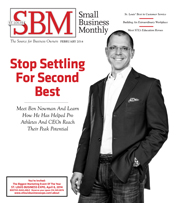
by Ron Ameln
It was a typical summer afternoon at a Washington, D.C. hotel. Guests were mulling around the lobby, some with suitcases and others heading to the pool. Sitting, huddled with one of his clients in the corner of the lobby was Ben Newman.
Newman, a coach, speaker and author from St. Louis, was helping one of his clients, a young linebacker attempting to make the Washington Redskins football team, get through the challenges and adversity of a high-stakes NFL training camp.
“What are the things you can control?” Newman is overheard saying to his client, who needs to leave for a team meeting in a matter of minutes. “Let’s focus on what you can control. You can’t control your spot on the depth chart. You can’t control whether or not you make the team. What can you do to improve what you can control? You can control your effort that puts you in the best position on the depth chart.”
The message paid big dividends. His client not only experienced a great training camp but made the team.
Newman, a native St. Louisan, works with professional athletes, CEOs, executives and sales leaders throughout the country helping them realize their true potential. When it comes to business owners, Newman believes there isn’t much difference between his NFL client and business owners.
“You just can’t say I am a really good business owner or a talented athlete and think everything will be ok,” Newman says. “You need to embrace adversity and understand the mental tools it takes to really perform at your highest level. The same things I am working with an NFL linebacker about are the same things I’m working with a business owner about.”
Newman works with CEOs to help them stop settling and reach their full potential. Settling is an epidemic facing many business owners. According to Newman, business owners often reach a certain level and they settle for less than the best.
“No matter what level of success I’ve had in the past, I have the same self-talk (as business owners),” Newman says. “Is what I have accomplished enough? I tell myself, ‘What I have is fine. You’ve done plenty.’ It’s the seduction of success.”
In order to keep yourself from settling for second best, Newman asks his clients to make a conscious choice to look at their daily behaviors and pick one area where they can increase their performance for three days by 10%. “It seems silly and easy, but it is really about recommitting to the processes that brought you success in the first place,” he says.
Newman has come up with an exercise called Your Prizefighter Day (see sidebar) to help his clients develop a process of continuous improvement. The key to the Prizefighter Day exercise is to focus each day on activities rather than trying to hold on too tightly to results that you ultimately cannot control.
It’s also about embracing a daily process that leads to a better you and not focusing as much on successes and failures. According to Newman, success is all about the process.
“The most accomplished individuals find great success when they focus on developing and exhibiting passion for the process,” he says. “The most successful teams have a passion for the process of what they do as opposed to the outcomes they can’t control.
“To take your company to the next level, you don’t wake up each morning saying we need to hit x-amount of dollars. You wake up and say, ‘What are the actions we need to take to make that goal become a reality and what have we done in the past that made us successful? Most of us just want to stare at the goal, say a prayer, and wait for it to happen. It just doesn’t work that way.
“The best advice is to look at your daily behaviors, silence the self talk and recommit yourself to the daily behaviors that made you successful in the first place. Silencing that little voice in your head will help you drive toward your next success.”
Your Prizefighter Day Exercise
The key: Each day identify three activity-driven goals that, if accomplished, will make the day victorious, regardless of any other obstacles that come your way. Remember, you are focusing on activities which you can control, and not results that are ultimately out of your control.
Personal Goal. Your personal goal should be something that will make you feel good. It should inspire, energize and motivate you to move forward in your day with confidence and drive. One example might be an early morning workout.
Business Goal. Your professional goal is focused on improving and building your business. One example might be to reach out to 10 new contacts or prospective clients each day, following up with current clients and completing your regular work-related duties. These are actions that will grow your business.
Service Goal. The service goal is never motivated by a sense of selfishness. It is one you want to attain without personal or professional gain. One example might be to connect two colleagues or friends who could benefit from the introduction.
Source: “Own Your Success,” by Ben Newman
Submitted 12 years 19 days ago